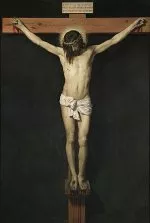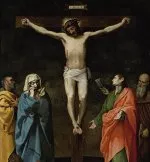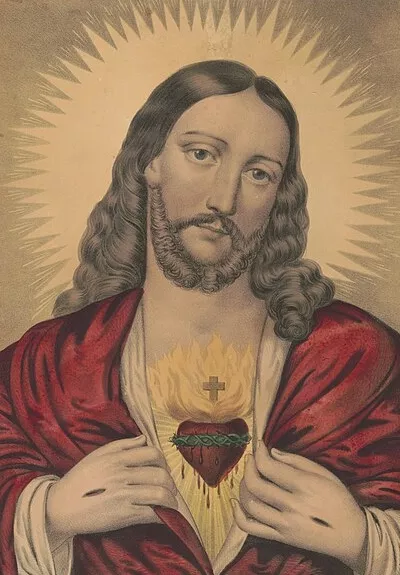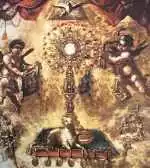JESUS AND JOSEFA: ON CHRIST'S WORSENING PASSION
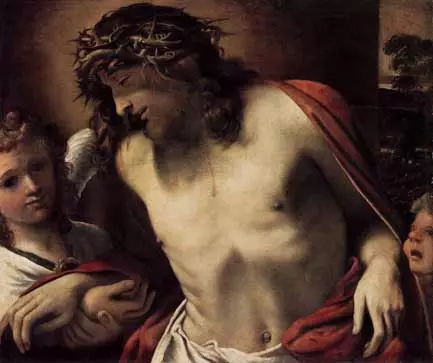
THE FIVE FIRST SATURDAYS IS A DEVOTION NEEDED NOW MORE THAN EVER! FIND OUT MORE HERE
THE SAINT MICHAEL PRAYER AND THE ROSARY
ARE ALSO POWERFUL PRAYERS TO HELP US THROUGH THESE VERY TURBULENT TIMES!
THIS IS AN ESSENTIAL TIME TO PRAY THESE PRAYERS FOR A HOLY POPE FROM BISHOP SCHNIEDER AND FATHER RIPPERGER AND ALSO FROM CARDNIAL BURKE!
HIGHLY RECOMMENDED! DELIVERANCE PRAYERS,
A BOOK FROM SENSUS TRADITIONIS PRESS
(A GREAT PUBLISHER HELPING US FIGHT OUR MANY SPIRITUAL BATTLES NOWADAYS)!
CHECK OUT OUR PODCAST PAGE AND OUR YOUTUBE CHANNEL FOR INSPIRING CONTENT
THIS WEB PAGE IS ALSO AVAILABLE AS A PODCAST HERE.
Welcome to the fourth part of Jesus and Josefa, a series of blogs and podcasts in which we cover some very moving words from our Lord to Sister Josefa Menendez, a very courageous, yet unassuming Spanish nun who practiced her vocation in France in the early 1920’s.
As is often the case, God reveals Himself or otherwise bestows special blessings on those we might not think of as being very significant. Sister Josefa was one such person. She was by all accounts humble and yet quite good natured in performing her tasks at the convent in which she resided.
Our Lord singled out Sister Josefa for some very important work, to articulate His thoughts about His religious and about humanity as a whole, and to help Him save souls in reparation for their sins.
Jesus gave her many graces and many wonderfully transcendent moments with Him when He would show up in her cell at various times. However, as with other religious and laity alike, he also allowed her to experience great suffering, in atonement for sinners.
She accepted these trials willingly and lovingly nonetheless. Our Lord, mindful of her love and her sacrifices, took her to our true home, Heaven, at the age of 33 in December of 1923.
What He told her goes under the heading of a private revelation, which we are not required to believe as Catholics, but that nonetheless has a great deal of merit for meditations. Jesus’ words to Sister Josefa appear in two books: The Way of Divine Love (a detailed biographical account of her life) and Christ’s Appeal for Love (a shorter version).
Both of these have the church’s imprimatur that there is nothing in them that is contrary to faith and morals. (Indeed, the late Cardinal Eugenio Pacelli recommended her work the year before He became Pope Pius XII in 1939!).
These excerpts I’ve selected from Christ’s Appeal for Love are also available as Podcasts on the Our Catholic Prayers Podcast Page. The Way of Divine Love is available in print and as an e-book. Christ’s Appeal for Love is available only in electronic form at this time.
On the first part of these “Blogcasts” we started with an introduction of some of our Lord’s stirring thoughts about his love for fallen humanity and for his religious, along with His salient advice for all of us to draw closer to Him in how we treat each other, very much in line with His words to in scripture where he says “If you love me, keep my commandments." (Taken from John’s Gospel Chapter 14, verse 15)
In the second part, we covered Christ’s talks about His Introduction of the Eucharist at the Last Supper and its touching significance for our lives. In part three Jesus described in heart-rending detail, the beginning of His Passion following the Last Supper from the Agony in the Garden at Gesthemane through His being denied three times by St. Peter!
In this fourth part, we first encounter Jesus in prison the night before His crucifixion. He compares his anguish there to that He finds in tabernacles around the world, even to this day. With so many people over the centuries not believing that our Lord is truly present in the Eucharist, it’s not hard to feel his pain at being ignored or otherwise treated so coldly.
Soon after, Jesus focuses on Pontius Pilate, the Roman governor of Judea, and his various equivocations and futile attempts to satisfy justice and yet keep order, in the face of an increasingly angry mob clamoring for Christ’s death.
Having Jesus scourged, which our Lord describes in painful detail, won’t be enough, nor will trying, as he does, to pass the buck by sending him to King Herod. Christ makes it a point here to warn us not to be like Pilate, in our own ways, by committing or condoning sinful behavior under the smarmy and all-too human guise of situational ethics!
Those of you who have seen Mel Gibson’s great film The Passion of the Christ will recognize some events here: Pilate’s exasperation in trying to keep order without losing his job; King Herod’s receiving Jesus with a mixture of curiosity and contempt, as if our Lord were his guest on some raunchy cable talk show; and Jesus’ dignity in the midst of this humiliation in His determination to do His Father’s will to open the gates of Heaven for the redemption of humanity, so that you and I may have Eternal Life!
We also see here how much God loves us but hates sin, in Christ’s admonishments for us not to give into temptations that could cause us to commit mortal sins. Pilate’s grave sin, thinking the scouring will take care of the situation, turns Jesus into someone, in His words, “in such a state of pitiable disfigurement as no longer to resemble a human being” covered with so many scars, yet still on His way to his death on the Cross! The crowd cries out for the thief Barabbas’ freedom, not that of our Lord.
Note that I’ve included dates and some topic headings given in Christ’s Appeal for Love. These excerpts from the book were taken from his talks with Josefa during Lent in 1923.
And now, drink in these words from Jesus slowly and thoughtfully at times. I hope they inspire you in meditative thoughts for your Rosary, Lenten devotions, and other prayerful moments.
Remember, Jesus Christ, the second person of the Trinity, isn’t talking just to Sister Josefa Menendez here. He’s speaking to us as well, me and you! He really and truly wants to be an important part, you might even say an essential part in each of our lives! God Bless.
March 17th, 1923
JESUS IN THE PRISON
Contemplate Me in the prison where I spent the greater part of the night. The soldiers came and, adding words to injuries, insulted Me, mocked Me, outraged Me, and gave Me blows on My face and on My whole body. Tired of their sport, at length they left Me bound and alone in the dark and noisome place, where, seated on a stone, My aching body was cramped with cold.
Compare the prison with the Tabernacle…and especially with the hearts that receive Me. In the prison I spent only part of one night…but in the Tabernacle, how many days and nights?
In the prison I was insulted and ill treated by soldiers who were My enemies. In the Tabernacle most often it is they who call Me their Father who treat Me thus, but how unlike that of children is the treatment!
In the prison I endured cold, sleeplessness, hunger and thirst, pain, shame, solitude, and desertion. And there passed before My mind’s eye all the tabernacles where in the course of ages I should lack the shelter of love…the icy-cold hearts that would be as hard and unfeeling as the stones of the prison floor were to My numbed and wounded body.
And how often should I wait for this or that other soul to visit Me in the Blessed Sacrament and receive Me into his heart… how many nights should I spend longing for his coming… but he would let business or carelessness or anxiety for his health get the better of him… and he would not come!
How often should I hunger for souls…for their fidelity…for their generosity. Would they satisfy that eager hunger by a little victory over self or by a slight mortification? Would they comfort Me in My sorrow by their tenderness and compassion? In some hard moment would they endure the pain…neglect…scorn…opposition…grief of soul or family…would they come to Me and say: “This I offer Thee to console Thy sadness, to keep Thee company in Thy solitude.”
Oh! If they would thus unite themselves to Me, with what peace would they face difficulties…how much fortitude they would win and how they would gladden My Heart!
In the prison what shame I felt at the obscene words of those around Me…and My distress was increased by the thought that like words would one day fall from lips I love.
When blows and buffets were rained upon Me by the filthy hands of the soldiery it recalled to My mind how often those who would receive Me into their hearts fouled by unrepented sin would shower reiterated blows on Me by habitual and willed sin.
And in the prison when they pushed Me and let Me fall to the ground bound and helpless, so many were present to My mind who would prefer a moment’s satisfaction to Me, would load Me with chains by their ingratitude, would push Me back and again cause Me to fall, by leaving Me alone.
March 20th, 1923
JESUS BEFORE PILATE
At dawn next day, Caiphus ordered Me to be taken to Pilate, that he might condemn me to death. Pilate questioned Me shrewdly, hoping to discover a true cause for My condemnation, but finding none, his conscience soon told him of what a grave injustice he would be guilty…so to evade the responsibility he sent Me to Herod.
Pilate’s soul is typical of those who, tossed between the impulses of grace and the allurements of their own passions, blindly yield to human respect and excessive self-love; for if they are faced by a temptation or a dangerous occasion of sin, they blind themselves and argue, until they gradually persuade themselves that there is no harm, no peril in it.
They are wise enough to decide for themselves and have no need of advice. They are afraid of seeming ridiculous in the eyes of the world. They lack energy to overcome themselves, and not making use of grace they fall into one occasion of sin after another until, like Pilate, they deliver Me up to Herod.
March 21st, 1923
To all Pilate’s questions I answered nothing, but when he said “Art Thou the King of the Jews?” then gravely and with full responsibility I replied: “Thou sayest it; I am King, but My Kingdom is not of this world.”
So, when an occasion of conquering human respect and accepting bravely either humiliation or suffering (even if it could easily be avoided) presents itself, a soul should answer: “'My Kingdom is not of this world,’ for that reason I do not seek human favor; I go to my true fatherland, where rest and joy await me. Meanwhile I will do my duty faithfully and make no account of the opinion of the world. If for this I must seek humiliation or suffering, I will not draw back. I will listen to the voice of grace and disregard that of nature. If I am unable to do this alone, I will ask advice, for I know how often self-love and passion blind me and entice me into the paths of evil.”
March 21st, 1923
JESUS BEFORE HEROD
Pilate therefore, overcome by human respect and the fear of shouldering his responsibilities, ordered me to be led to Herod, a perverse man who sought only to satisfy his unruly passions. He was glad when he saw Me appear before his Court because he hoped for entertainment through My words and miracles.
Consider, O beloved souls, my repulsion when brought face to face with so vicious a man, whose questions, gesticulations, and movements filled Me with shame.
Listen to the false witnesses. See the implacable desire of this crowd avid for scandals and before which I am made a laughing-stock. Herod expected Me to reply to his sarcastic remarks, to justify and defend Myself, but I opened not My lips and kept the most profound silence in his presence.
This silence testified to My sovereign dignity, for the obscene comments of so perverted a man were not worthy of exchange of words with the All-pure.
During this interview My Heart was closely united to My Heavenly Father. I desired ardently to shed the last drop of My Blood for souls whom I love so much, and I was all inflamed with love at the thought of those who would follow My example and My generosity.
Not only did I rejoice during this terrible interrogation, but I was urged from within to hasten the moment of My suffering on the Cross.
After undergoing these ignominies in complete silence, I allowed Myself to be treated as a fool and arrayed in a white garment, the sign of derision, and thus I was led back to Pilate amid the jeers of the multitude.
March 21st, 1923
RETURN TO PILATE
Look at Pilate! See how afraid and disturbed he is. He is at his wits end in order to calm the fury of the people who demand My death. He orders Me to be scourged.
Such is the soul that has not enough courage and generosity to break energetically with the world’s demands, her nature or her passions. Instead of obeying conscience and making short work of temptation which she knows did not come from the good spirit, she yields to one fancy or another, to a slight satisfaction.
If she overcomes herself on one point, she gives in on another which would need greater effort. If she does some mortification, she hesitates about others which would ensure her fidelity to grace or the Rule, but would deprive her of some small pleasure. She allows herself half of what nature or passion demands and so soothes her conscience.
Like Pilate you give Me up to the scourges! Do not think you will satisfy passion thus…today so much, tomorrow more. And if you have given in only on a small provocation, how will you act when temptation is violent?
March 21st, 1923
THE SCOURGING OF JESUS
Contemplate Me, O My beloved, being led away as a meek lamb to the shameful and terrible punishment of the scourging.
Blow after blow is discharged by the executioners on My body, already covered with bruises and broken with fatigue. With whips and knotted cords they strike Me with such violence that My very bones are shaken and I am torn with innumerable wounds.
Bits of My divine flesh are rent off by the scourges. Blood flows from every limb, and I am reduced to such a state of pitiable disfigurement as no longer to resemble a human being.
Can you contemplate Me in this sea of sorrow and remain unmoved? Pity I did not expect from My executioners but from you, O My chosen souls I look for compassion! See My wounds! Who has suffered for love of you as I have?
March 22nd, 1923
JESUS CROWNED WITH THORNS
When at last, exhausted by their exertions, these hard and cruel men desisted, they wove a crown of thorns and drove it deep into My head, and as they filed before Me, they mockingly cried out: “We salute Thee, O King!”
Some insulted Me, others savagely struck Me on the head and each and all added new agonies to those which already racked My body.
O you whom I love, contemplate Me condemned to death, given over to the insults and profanations of the mob, scourged at the pillar, and as though all this were not sufficient to reduce Me to the most humiliating condition, now crowned with thorns, clothed in a purple rag, and derisively hailed as mock king…and treated as a fool.
I, the Son of God, who hold the universe in the palm of My hand, willed that in men’s eyes I should appear as the last and most contemptible of all. Far from flying from such humiliations, I willingly endured them to expiate man’s pride and draw souls to follow in My footsteps.
I expiated by this painful crowning the pride of those who refused to accept anything that lowers them in the eyes of the world.
I allowed My shoulders to be covered by the cloak of mockery and Myself to be treated as a fool, so that many souls would not scorn to follow Me in a way that the world holds as vile and humiliating and which to them might seem beneath their condition.
March 23rd, 1923
BARABBAS IS PREFERRED TO JESUS
We are going to make souls understand how many allow themselves to be deceived by pride.
Crowned with thorns enclosed in the purple mantle, and amidst overwhelming insults and mockeries, I was brought back by the soldiers to Pilate. Finding in Me no crime worthy of death, he questioned Me again and asked Me why I did not reply, seeing that he had the power to crucify Me or release Me.
Then breaking silence I said: “Thou wouldst have no power over Me unless it were given thee from above, but the Scriptures must needs be fulfilled.” After which I resumed my silence, surrendering Myself wholly to God.
Pilate, meanwhile troubled by a message from his wife, and worried by the remorse of his conscience and fearing that the people might turn against him if he refused to sentence Me to death, sought for a pretext to release Me.
So presenting Me to the people in the pitiable plight to which I had been reduced, he offered to free Me and condemn instead Barabbas the thief. But the multitude cried out angrily with one voice “Let Him die! He must die and let Barabbas be set free.”
O all ye who love Me, consider how I was compared to a thief…or rather valued lower than a degraded criminal, one of the wickedest of men. Hear their cries of rage against Me and their vociferous clamors for My death.
Far from seeking to escape this affront, I lovingly accepted it for love of souls, for love of you…desirous of showing you that My love was leading Me not only to death, but to contempt, ignominy and hatred of those very men for whom I should shed My Blood in such profusion.
I was treated as a disturber of the peace, as insane, a madman, and I accepted it all with the utmost meekness and humility.
Do you think that in My human nature I felt no repugnance and grief? I willed to know experimentally all that would have to be undergone by you, that you might draw strength from My example for all the circumstances of your life. So, I did not free Myself though this would have been easy.
I accepted all lovingly that thus fortified you might understand how to sacrifice every repugnance in order to accomplish the holy will of God My Father…repair His glory…expiate the sins of the world and win the salvation of many souls.
When I was to be born of poor and humble parents… far from My country and home…in a stable…in the severest season of the year and the coldest of nights…did I hesitate? Did I refuse?
During thirty years I knew the hard toil of an obscure workshop, bearing the contempt and indifference of those for whom My father, St. Joseph, worked. Nor did I disdain to help My Mother in the humble and hidden occupations of her poor household.
Had I not more knowledge than was needed for the humble trade of a carpenter, I who at twelve years of age taught the Doctors in the Temple? But such was My Father’s will and consequently it was in this way that I gave Him glory.
From the beginning of My Public Life, I could have made Myself known at once as the Messiah and Son of God, so as to attract the intention and veneration of men to My teaching. I did not do so, because My one desire was to follow in all things My Father’s will.
And when the hour of My Passion had struck, see how in spite of the cruelty of some, the insults of others, the desertion of My own, the ingratitude of the crowds…the unspeakable martyrdom of My body and the intense repugnance of My human nature, I embraced with ever more love that holy will.
And with those moving words from our Lord, we conclude this 4th installment of Jesus and Josefa. On the next one, which is also available as a Podcast on the Our Catholic Prayers Podcast Page, Jesus describes in vivid detail His journey on the Way of the Cross and his subsequent crucifixion at Calvary.
God Bless,
Christopher Castagnoli
for www.ourcatholicprayers.com
FROM OUR BOOK AND GIFT STORE
OR CAFE PRESS STORE!
Return from Christ's Worsening Passion
to Catholic Prayers Blog Page List





